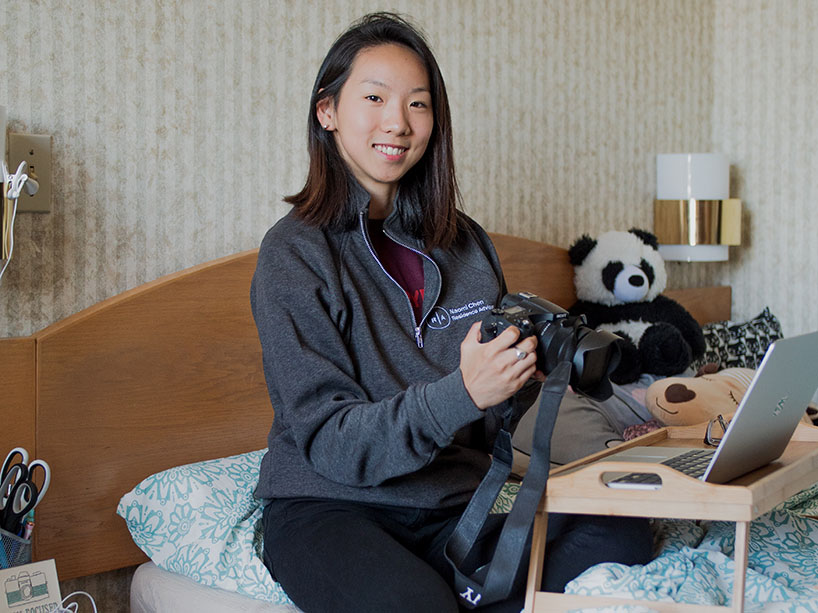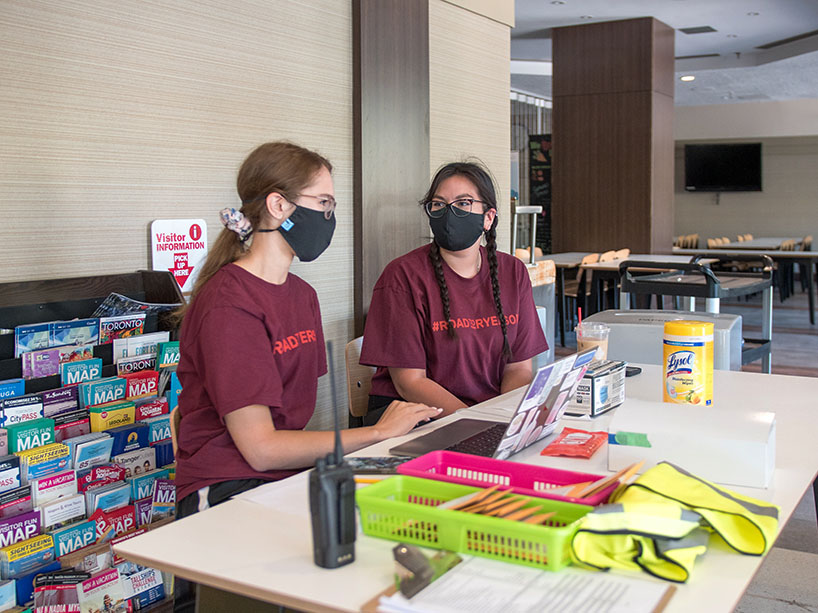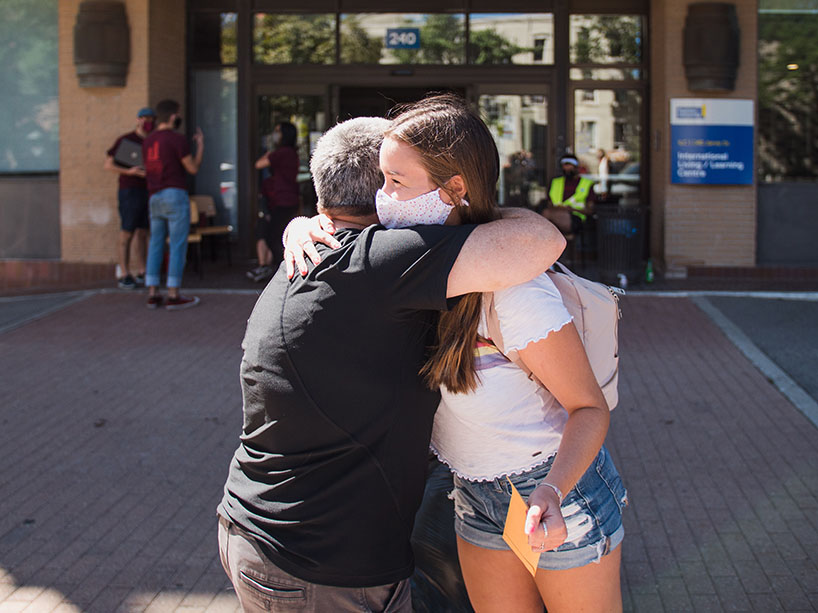Residence life in the pandemic: Students stay safe, supported and connected

When the pandemic hit this past spring, media production student Naomi Chen, whose parents live in China, was grateful she could continue living in residence. Photo: Nikita Ovsyannikov.
When the pandemic hit this past March, Ryerson international student Naomi Chen was living in residence – and wasn’t sure what would happen.
“Suddenly, we were going into quarantine, and I thought, ‘Is my residence going to shut down? Where will I live?’” said the 20-year-old, who had been living on-campus for two years.
As questions set in, there was one thing she was sure of: she would be supported.
“I always knew that no matter what, the residence leadership team, the front desk and security staff – they would be here for us. That part was really comforting,” said Chen.
To prevent the spread of COVID-19, the majority of the more than 1,100 students in Ryerson’s residences, including Pitman Hall, the Daphne Cockwell Complex (DCC) and the International Living and Learning Centre (ILC), were required to move out, based on public health guidance.
While many students moved back home with their families, for some, like Chen, whose parents live in China, staying in residence was the best option. Housing and Residence Life allowed such students and anyone with extenuating circumstances to stay.
Marcelle Mullings, director, Student Housing & Community Care, says students are always a top priority.
“We’ve always provided support for students who had nowhere else to go,” she said, explaining that at the time, some students were still arranging travel to their home countries, some couldn’t return home for various health reasons, and others had jobs arranged in downtown Toronto.
For Chen, the chance to stay on campus meant a lot.
“Getting to live in residence gave us a community to rely on at a really difficult time, and having the residence leadership team to talk to if we needed anything - that was so comforting to a lot of people,” she said, pointing out that if she had had to go to a hotel or another type of accommodation, she would have been uncertain about who was coming and going, and wouldn’t have the safety, security and support provided by Ryerson’s residence and housing team.
‘Kudos’ to housing staff

Student leaders help with residence move-in day on Aug. 31, 2020. Photo: Nikita Ovsyannikov.
With Pitman remaining open all summer, members of the housing team continued coming to campus daily as part of the university’s essential services, to help ensure students were supported.
They included service desk staff, those involved in helping with move-outs, office staff on rotation, maintenance and cleaning staff and others in more operations-focused roles. Staff supported the summer housing and co-op program, while also preparing to receive and process residence applications for the upcoming year, provide virtual tours and more.
“Housing is an essential service - and our team really stepped up. Many of them were commuting from out of town at a time when a lot of people were afraid to leave their homes. I give big kudos to all of them,” Mullings said.
“We also have full-time staff who live in our buildings to provide that 24-hour, in-person support,” she added.
Safety measures quickly established
The residence team quickly established health and safety measures: implementing a no-guest policy, a mandatory face-mask policy, closing common areas, increasing cleaning protocols, facilitating contact tracing, installing hand-sanitizer stations, changing move-in processes to ensure physical distancing and decreasing capacity to ensure each student had their own bathroom.
“There are months of preparation that go into a regular year, in terms of training staff and getting everything ready. So, doing that on top of completely revamping everything, our staff has really stepped up to make things happen,’ said Simon Finn, associate director, Residence Life and Education and member of Ryerson’s Housing and Residence Life team.
COVID-19 hotline
A 24-hour hotline was also established for students to report if they had any symptoms of COVID-19 or health-related questions and to support students who were self-isolating.
Housing Operations and Administration associate director Val Bruce and her team also worked with campus partners to help students who needed to self-isolate. For instance, new international students needed to quarantine for two weeks upon arrival.
As part of this effort, Bruce says coordinating with International Student Support was crucial.
“Together, we ensured students had the information they needed and could keep us updated on their arrival plans and any quarantine requirements they had,” Bruce said, adding that she and her team also coordinated with families who were dropping off supplies, and worked with Food Services to ensure meals were delivered safely to anyone in quarantine.
“Of course, we also had to ensure all of the other student needs were supported,” said Finn, noting that residence staff continued to provide resources for students to help with personal concerns and mental health.
Preparing for fall

A student hugs her mom on move-in day, which involved many protocols to help keep students and their families safe. Photo: Nikita Ovsyannikov.
With the focus now on the fall semester – another challenge has been preparing staff amid COVID-19 protocols.
“We had to completely revamp training to be online, while also ensuring they were getting the same quality experience,” said Finn.
Move-in day – “usually a big celebration,” said Mullings – was also completely revised. It took place over two days at the end of August, with students assigned specific time slots to limit the number of people coming and going.
Only about 350 students – mostly first year, and far fewer than last year’s roughly 1,144 students – will live on campus in the fall term.
They’ll be supported by 70 staff members who, collectively, provide 24-hour support – including 15 full-time staff, 36 live-in student staff members and 33 live-out student staff.
Mullings says one of great things about the housing program is being able to provide employment and financial support to those student leaders who provide live-in and live-out support.
Finn says their support this year will be especially significant.
“The transition into university will be a big challenge for a lot of students, especially since these students didn’t get to finish their senior high school experience. So, our residence life team will be there to help them – whether it’s personal or academic support, or helping them build community,” Finn said.
“We’re using technology in a lot of ways, for example, having movie nights with things like Netflix party. We’re looking at exploring those things further,” he explained.
Access to on-campus resources, support
Even with restrictions in place, Mullings says living in residence has many benefits.
“For some students, living at home may be distracting. In residence, they will have a place where they can focus on their academic studies. They will also be part of a community with resources to help them both academically and personally,” she said, adding that students in residence will also be close to some of the campus resources that will be open on a limited basis by appointment only – including the Library, the SLC (Student Learning Centre) and the MAC (Mattamy Athletic Centre).
“We’re working hard to make sure protocols are in place to support students. We don’t want it to be just about compliance and rules, we want students to have a place to safely connect with others,” Mullings said.
Chen, who, as an Academic Link, will be helping students in residence with their studies, agrees.
“It’s been very safe in terms of the precautions taken, but also very student-friendly. I’m looking forward to helping foster a sense of community this year,” she said.
This is one story in a series about how Ryerson University departments have successfully faced the challenges presented by COVID-19. Is there a team you think deserves recognition? Email us at ryersontoday@torontomu.ca.
Read more stories recognizing outstanding Ryerson teams.
Related
